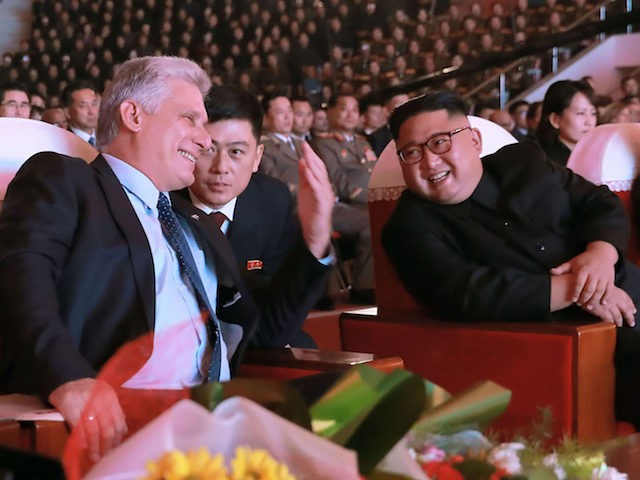Cuba’s Miguel Díaz-Canel, who holds the title of “president” but remains subordinate to dictator Raúl Castro, received a hero’s welcome in North Korea on Sunday and Monday, enjoying a theater performance and street parade with dictator Kim Jong-un.
Cuba and North Korea have been diplomatic allies for decades, spanning back to the establishment of communist authoritarian systems in both nations in the middle of the 20th century. Díaz-Canel had visited North Korea in the past as vice president and met with senior North Korean officials on multiple occasions this year.
The coverage in the communist state media of both countries emphasized the friendly rapport between the two men. Granma, the official newspaper of the Cuban Communist Party, reported on Sunday that Díaz-Canel and his entourage had left the last stop on his Asia tour, Russia, “overflowing with emotions” about returning to North Korea. Upon arrival, Díaz-Canel reportedly received “all the military honors corresponding to his high status from Kim Jong-un.”
Kim personally greeted Díaz-Canel at the airport and the two conducted a tour of Pyongyang via parade, welcomed by throngs of cheering North Koreans who face severe retribution if they are insufficiently enthusiastic at government events. “Thousands of people waved flowers, flags, and balloons, and the message of Pyongyang and Havana was perfectly intelligible,” Granma proclaimed.
Granma does not detail any policy discussions between the North Korean leader and Castro’s representative. The Korean Central News Agency (KCNA), North Korea’s official news service, did report that Díaz-Canel applauded North Korea for “invariably advancing along the road chosen by themselves and making a rapid development under the leadership of Kim Jong Un.”
The two sides reportedly also discussed expansions in trade and scientific development. “Kim and Diaz-Canel discussed the issue of further expanding and developing cooperation and exchanges in various fields, including the economy, culture, public health, science and technology,” KCNA reported.
Kim and Díaz-Canel engaged in political talks behind closed doors before attending an artistic event held in the Cuban representatives’ honor. According to Granma, Díaz-Canel was treated to “a beautiful spectacle” in Pyongyang including North Korean local artists’ performances of Cuban communist anthems and the classic Cuban folk song “Guantanamera.”
KCNA reports similarly that Díaz-Canel also attended a “grand banquet” where Kim Jong-un regaled him with compliments.
Kim “said that the meeting with the Cuban president marked a watershed in demonstrating the will to carry forward forever the friendship between the two countries,” according to KCNA. “Saying that the two countries are in the same trench in the struggle for defending sovereignty and dignity of their countries and safeguarding international justice, he expressed invariable support and encouragement to the Cuban people building a powerful and prosperous country.”
Díaz-Canel responded by noting that his visit occurred “at a historic period of inheriting the cause of the revolution in Cuba … an evident sign of the fixed stand of the Cuban party and government to invariably develop the relations with the DPRK.”
The visit arrives amid the strongest sanctions ever imposed on North Korea internationally and the beginning of a new round of nuclear disarmament talks between North Korea and the United States. Cuba has proven a useful ally to North Korea at the United Nations and other global forums and itself has taken on an emboldened attitude towards America and repression of its own people in light of economic and political concessions made in 2014 by the Obama administration.
North Korea most recently sent its vice chairman of the Central Committee of the North’s Workers’ Party Choe Ryong-hae to Cuba in August to discuss political cooperation. At the time, experts speculated that North Korea would recruit Cuba to pressure the Trump administration, which has begun the process of overturning Obama-era policies towards the Castro regime, to support a reduction in sanctions on Pyongyang.
Prior to Choe’s visit, a coalition of other senior figures arrived in Havana in July, the first such visit since Castro handed the title of “president” to Díaz-Canel. Castro remains the head of the Communist Party and the Cuban military, however, making him the most powerful man in Cuba.
Díaz-Canel has already visited China and Russia on his current trip to Asia and is expected to follow his visit to North Korea with stops in Laos and Vietnam. All the countries on his itinerary except for Russia are officially communist countries.
Follow Frances Martel on Facebook and Twitter.

COMMENTS
Please let us know if you're having issues with commenting.